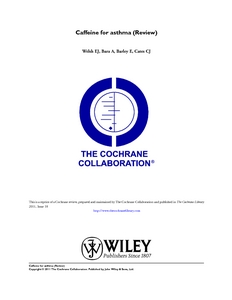Welsh, EJ; Bara, A; Barley, E; Cates, CJ
(2010)
Caffeine for asthma.
COCHRANE DATABASE OF SYSTEMATIC REVIEWS (1).
pp. 1-35.
ISSN 1469-493X
https://doi.org/10.1002/14651858.CD001112.pub2
SGUL Authors: Cates, Christopher Joseph Welsh, Emma Jane
![[img]](https://openaccess.sgul.ac.uk/2686/1.hassmallThumbnailVersion/CD001112.pdf)  Preview |
|
["document_typename_application/pdf; charset=binary" not defined]
Published Version
Download (370kB)
| Preview
|
Abstract
Background
Caffeine has a variety of pharmacological effects; it is a weak bronchodilator and it also reduces respiratory muscle fatigue. It is chemically related to the drug theophylline which is used to treat asthma. It has been suggested that caffeine may reduce asthma symptoms and interest has been expressed in its potential role as an asthma treatment. A number of studies have explored the effects of caffeine in asthma, this is the first review to systematically examine and summarise the evidence.
Objectives
To assess the effects of caffeine on lung function and identify whether there is a need to control for caffeine consumption prior to either lung function or exhaled nitric oxide testing.
Search strategy
We searched the Cochrane Airways Group trials register and the reference lists of articles (August 2009). We also contacted study authors.Selection criteriaRandomised clinical trials of oral caffeine compared to placebo or coffee compared to decaffeinated coffee in adults with asthma.
Data collection and analysis
Trial selection, quality assessment and data extraction were done independently by two reviewers.
Main results
Seven trials involving a total of 75 people with mild to moderate asthma were included. The studies were all of cross-over design.Six trials involving 55 people showed that in comparison with placebo, caffeine, even at a 'low dose' (< 5 mg/kg body weight), appears to improve lung function for up to two hours after consumption. Forced expiratory volume in one minute showed a small improvement up to two hours after caffeine ingestion (SMD 0.72; 95% CI 0.25 to 1.20), which translates into a 5% mean difference in FEV1. However in two studies the mean differences in FEV1 were 12% and 18% after caffeine. Mid-expiratory flow rates also showed a small improvement with caffeine and this was sustained up to four hours.One trial involving 20 people examined the effect of drinking coffee versus a decaffeinated variety on the exhaled nitric oxide levels in patients with asthma and concluded that there was no significant effect on this outcome.
Authors' conclusions
Caffeine appears to improve airways function modestly, for up to four hours, in people with asthma. People may need to avoid caffeine for at least four hours prior to lung function testing, as caffeine ingestion could cause misinterpretation of the results. Drinking caffeinated coffee before taking exhaled nitric oxide measurements does not appear to affect the results of the test, but more studies are needed to confirm this.
| Item Type: |
Article
|
| Additional Information: |
This review is published as a Cochrane Review in the Cochrane Database of Systematic Reviews 2011, Issue 1. Cochrane Reviews are regularly updated as new evidence emerges and in response to comments and criticisms, and the Cochrane Database of Systematic Reviews should be consulted for the most recent version of the Review. Welsh EJ, Bara A, Barley E, Cates CJ. Caffeine for asthma. Cochrane Database of Systematic Reviews 2010, Issue 1. Art. No.:
CD001112. DOI: 10.1002/14651858.CD001112.pub2. |
| Keywords: |
Adult, Asthma, Bronchi, Bronchodilator Agents, Caffeine, Humans, Randomized Controlled Trials as Topic, Respiratory Function Tests, Science & Technology, Life Sciences & Biomedicine, Medicine, General & Internal, General & Internal Medicine, Asthma [drug therapy], Bronchi [drug effects], Caffeine [pharmacology; therapeutic use], Randomized Controlled Trials as Topic, Respiratory Function Tests, Adult, Humans, EXHALED NITRIC-OXIDE, INDUCED BRONCHOCONSTRICTION, COFFEE, BRONCHOPROVOCATION, DECREASES, ALCOHOL, Asthma [drug therapy], Bronchi [drug effects], Caffeine [pharmacology; therapeutic use], Randomized Controlled Trials as Topic, Respiratory Function Tests, Adult, Humans |
| SGUL Research Institute / Research Centre: |
Academic Structure > Population Health Research Institute (INPH) |
| Journal or Publication Title: |
COCHRANE DATABASE OF SYSTEMATIC REVIEWS |
| ISSN: |
1469-493X |
| Related URLs: |
|
| Web of Science ID: |
WOS:000274654000018 |
| Dates: |
| Date |
Event |
| 2010-01-20 |
Published |
|
| URI: |
https://openaccess.sgul.ac.uk/id/eprint/2686 |
| Publisher's version: |
https://doi.org/10.1002/14651858.CD001112.pub2 |
Statistics
Item downloaded times since 12 Dec 2012.
Actions (login required)
 |
Edit Item |


